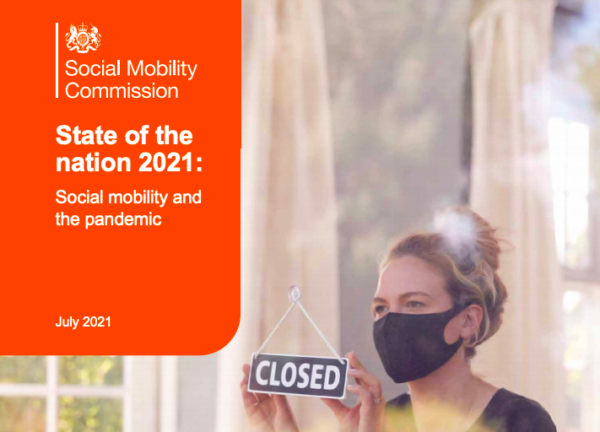The Social Mobility Commission has published their annual report, State of the Nation, today. This year the report looks at progress made in all four UK nations in tackling poverty, addressing inequality and improving social mobility. You can access the report here.
Context
The State of the National Report highlights the devastating impact of Covid-19 on the UK, warning that this will be felt for decades. Attainment gaps between disadvantaged and privileged children at school are already widening and young people from poorer backgrounds have been more likely to lose paid work than better off peers.
The report found that all four nations of the UK have struggled with the damaging impact of the pandemic from early years to training and employment, and that social mobility, already stagnant, could move backwards.
Key Findings
United Kingdom
Disadvantaged young people living in poverty have been hardest hit by Covid-19 with a real risk of scarring effects.
- 4.3 million children – almost one third of children in the UK – were living in poverty as of March 2020. This is an increase of around 700,000, or 3.7 percentage points, from March 2012.
- People from lower socioeconomic backgrounds are more likely to work in sectors that were shut-down during the pandemic; these roles were more likely to be furloughed, seeing their working hours reduced and their income hit.
- Digital poverty is a growing problem; only 51% of households earning between
- £6,000 to £10,000 had home internet access, compared with 99% of households with an income over £40,000 (as of March 2020).
- Professional roles are growing in the UK, yet those from a privileged background are 60% more likely to be in professional roles.
- People from working class backgrounds in professional jobs earned about £6,000 less than their more privileged counterparts in professional jobs.
England
- 30% of children in England live in poverty, a much higher rate than Scotland or Northern Ireland, but similar to Wales.
- By autumn 2020, disadvantaged children in primary schools were seven months behind their more advantaged peers. This included an extra one month of learning loss during the start of the pandemic.
- In the north-east of England, child poverty rates have risen sharply by around 11 percentage points in five years (from 25% to 37%). They are now close to the London rate of 38%
Scotland
- The attainment gap is narrowing, but not quickly enough. Only about 83% of pupils from the most deprived areas reach the expected standard at secondary school, compared to 96% of pupils from the least deprived areas
- Place matters in Scotland: deprived and post-industrial areas have the worst education and employment outcomes
- 58% of those from professional backgrounds end up in these jobs, compared to 36% of those from working class backgrounds.
- Scotland has consistently had low rates of child poverty compared to England and Wales, but 24.3%, or 240,000 children, remain in poverty.
Wales
- The gap between the proportion of free school meals and non-FSM pupils who receive a good standard at GCSEs has remained the same since 2007, at around 32 percentage points. But Wales has introduced a socio-economic duty.
- Wales has the joint highest child poverty rates in the UK, along with England with 31% of children in poverty.
- The levels of in-work poverty in Wales are amongst the worst in the UK. 71% of children living in poverty live in working households, a figure which has been steadily increasing in recent years.
- 53.7% of those from professional backgrounds end up in professional jobs, compared to only 35.7% of those from working class backgrounds.
Northern Ireland
- Qualification levels, wages, the proportion of high-paid jobs, the rate of job creation and new start-up growth are all lower in NI than the UK average.
- 25% of jobs pay less than the real living wage of £9.30.
- Almost one-quarter (24%) of children in Northern Ireland live in a household that, on income levels alone, struggles to provide the basics of heat, food and clothing or meet childcare costs.
- The unemployment rate, estimated at 3.7%, has remained below the UK average since 2017. Almost a third (31.4%) were long term unemployed and more than one in ten (10.7%) were young adults aged 16-24.
- Those from professional backgrounds are still 80% more likely to be in those jobs than those from working class backgrounds.
Recommendations
- End two child limit for Universal Credit so larger families are not penalised.
- Raise Universal Credit child payments and child benefit by at least £10 per week per child.
- Expand eligibility for entitlement for 30 hours free childcare per week to all families.
- Extra funding for pupil premium to reflect long-term disadvantage.
- A student pupil premium for disadvantaged 16-19 year olds.
- Employability and life skills teaching mandatory at school end-of-year after GCSE’s and A levels.
- Affordable access to digital devices and networks by ring-fencing a portion of the digital infrastructure budget.
- Tailor the apprenticeship levy more effectively for disadvantaged trainees.
- Greater powers for metro mayors to address geographical inequalities.
- Build 3 million social homes in next 20 years.
- Draw up measures to track social mobility progress over next 30 years.





